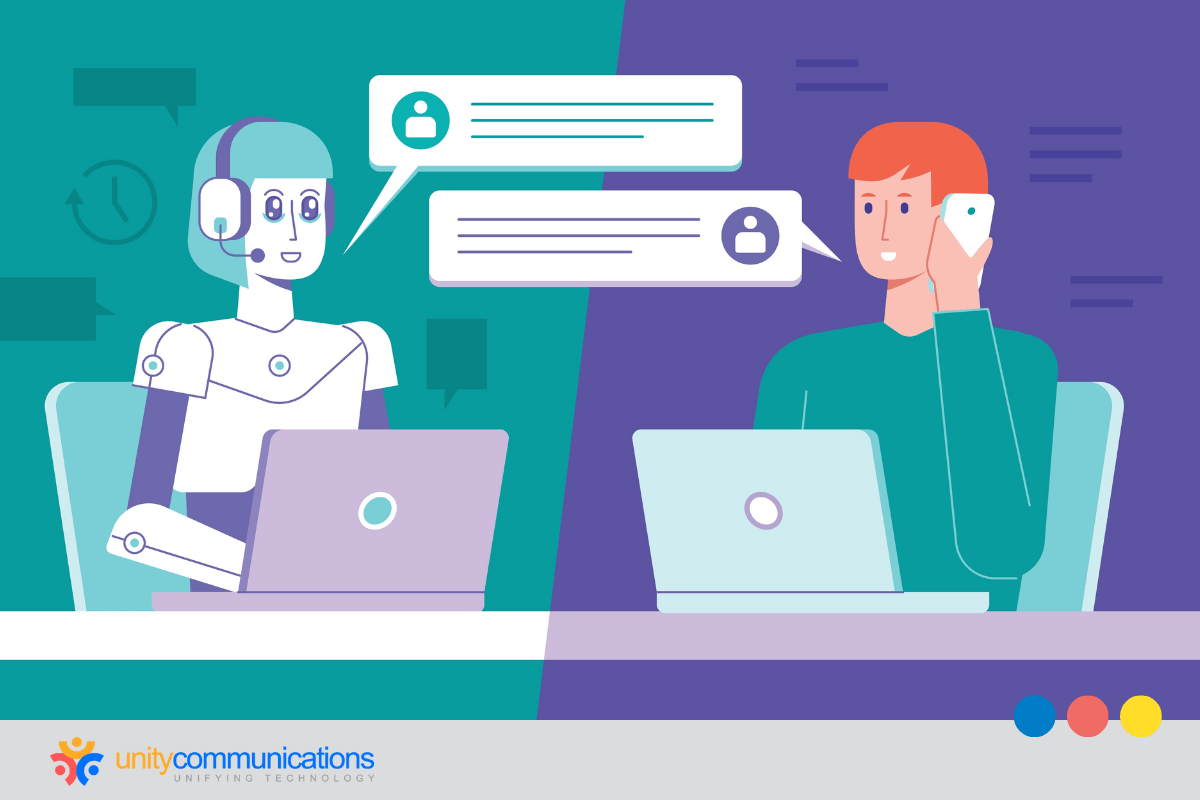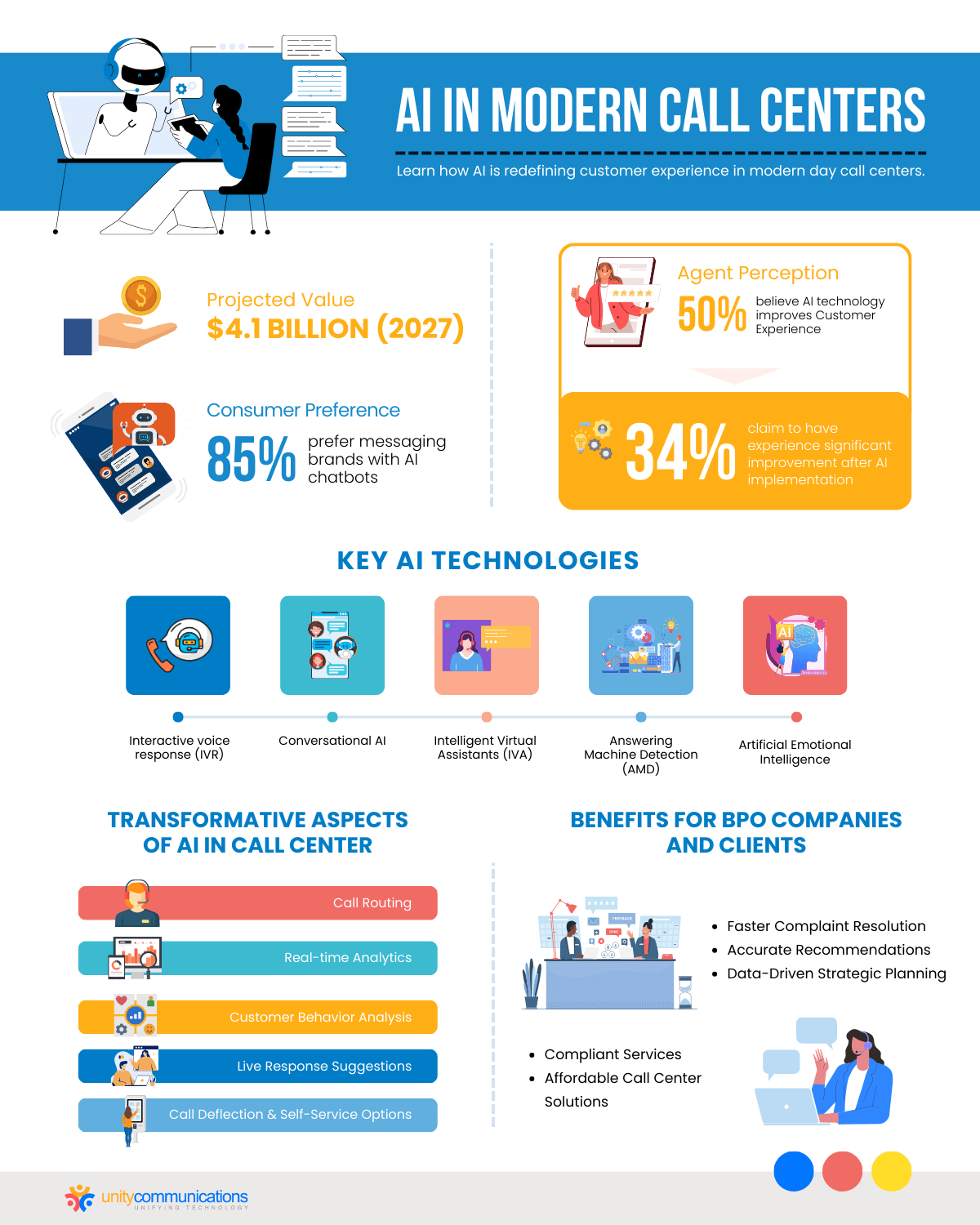IN THIS ARTICLE
Table of Contents
An excellent customer experience (CX) sets businesses apart from their competition. Central to customer support are call centers, the most important touchpoint for brands aiming to improve CX.
Digital transformation for business process outsourcing (BPO) companies and call centers is becoming more vital as customer demands change. Introducing artificial intelligence (AI) in call centers offers BPO providers and clients various benefits.
Let’s talk about how AI fits into call centers.
Examples of AI in Call Center Technology

What is a BPO call center? A call center involves a team of third-party agents who handle incoming and outgoing customer calls for the client. Not all businesses have the tools, staff, and skills to meet their customers’ call center expectations, so some prefer outsourcing the function.
BPO companies have AI-powered call centers that can efficiently manage such functions. The market for AI call centers is projected to reach $4.1 billion by 2027.
Machine learning (ML) and AI technology in contact centers boost efficiency as they work in the background. Contact center software offers AI for smart call routing, compliance and quality monitoring, lead generation, and lead pre-qualification.
Here are the best-known examples of AI and ML features in modern call centers:
1. Interactive voice response (IVR)
AI-enabled IVR systems use analytics and voice responses to automate call routing. An IVR system will send custom messages across multiple channels if you have an automated message that you need to communicate.
Conversational IVR systems also guide prospects and customers through various options to reduce the automated feel. The good thing about AI-powered IVRs is that they are scalable on demand.
2. Conversational AI
Conversational AI powers chatbots and other online chat options and is commonly used for customer service inquiries. Since 85% of consumers prefer to message brands, chatbots are a vital customer service channel. With chatbots, customers can easily engage with web content and use self-support options without contacting a live agent.
Chatbots allow customers to solve issues independently and minimize the workload on agents. It also reduces call volume, so agents do not need to answer basic, repetitive questions.
3. Intelligent Virtual Assistants (IVA)
Modern call center AI tools sound very realistic. A good IVA uses advanced speech recognition, natural language processing (NLP), and ML to enable conversations that closely mimic human speech. The best IVA tools provide natural, human-like experiences for end users and leads.
IVA technology also helps call centers manage efficiency and costs in their workforce. Call centers are more flexible in connecting leads to the right live agent and identifying how many staff members are needed because the AI can handle multiple customer interactions simultaneously.
4. Answering Machine Detection (AMD)
Outbound call center agents know the issues that come with answering machines and voicemails. Lead generation assistants and the sales team must stay in rhythm to have successful conversations—too many voicemails can disrupt that.
A good AMD solution can fight this problem. Highly accurate AMD tools are trained using ML to improve their ability to judge whether the voice on the other end is a human or a voicemail message, which leads to improved productivity levels.
5. Artificial Emotional Intelligence
This is another version of AI in call centers that monitors customer sentiment during customer interactions. Artificial emotional intelligence measures how often an agent interrupts a customer and tracks both parties’ tone of voice. It then gives agents pop-up messages with live feedback to help them understand how the customer feels during the call.
Emotional intelligence AI is trained in different cultural and linguistic contexts, so it is applicable to countries with different cultural and language styles. Fifty percent of agents believe using this technology somewhat improves CX, while 34% claim to have experienced significant improvement.
How Call Centers Can Use AI to Empower Agents
Innovation thrives in call centers. Technology empowers agents and transforms customer interactions in the following ways:
- Call routing: Automation can significantly accelerate identifying the right agent for a call.
- Call analytics: AI can capture a wealth of information during each customer interaction using sentiment analysis, speech analytics, and NLP.
- Customer behavior: AI can detect trends in customer behavior to provide insights, predict emerging needs, and develop best practices.
- Real-time response suggestions: AI can provide live feedback about the conversation’s flow, search knowledge bases for solutions, and help agents formulate replies for various situations.
- Call deflection and self-service options: Call centers can assign routine questions and other simple interactions that might be classified as “self-service” to AI.
Benefits of AI in Call Centers

As customer demand changes, AI tools in call centers provide numerous possibilities to help businesses thrive. Small businesses that outsource their contact center to a provider that uses AI and ML have a better opportunity to compete with giants in their industry, improve efficiency, and stay up to date with best practices.
Here are ways AI in call centers benefits BPO companies and clients:
1. Handle Customer Complaints Faster
AI improves areas of customer service where manual issue resolution takes up unnecessary time. AI can also manage and automatically answer basic complaints using tools such as optical character recognition (OCR).
Advanced tools can also grasp customers’ tones to help agents find and quickly respond with the appropriate reply. It then saves the responses for future reference, accelerating average handling time (AHT). This means agents can handle more tickets quickly, and end customers are not stuck in long calls.
2. Give More Accurate Recommendations
AI tools can give agents more accurate recommendations to support them during a call. It uses sentiment analysis to understand what customers want to accomplish during the interaction and provides agents with the best solution.
This technology also assigns customers a risk score based on how often they have called or referenced canceling their accounts. More accurate recommendations lead to shorter interaction times and a more customized, positive client experience. BPO clients benefit from this feature since end customers are happier and more satisfied.
3. Gather Data Performance Insights for Strategic Planning
Manually analyzing the large amounts of data collected in a call center daily is expensive and impractical. AI manages, analyzes, and generates accurate insights from this vast information. It also quickly filters through copious amounts of data to get the required outputs.
Intelligent analytics reports offer insights into the strengths and weaknesses of each AI-driven campaign to help companies make more strategic decisions. With this, the BPO provider and client can deliberate on the best way to improve customer service.
4. Provide Fully Compliant Services
Auditing call interactions with AI ensure better adherence to scripts, regulations, and company standards, whereas tools such as dynamic script writing help improve agent conversations for stricter compliance control.
AI plays a big role in enhanced quality control, more compliant conversations, and better overall performance. With the rapid migration to virtual call centers, tapping into AI for compliance control and quality monitoring is crucial for future growth.
5. Tap into Affordable Call Center Solutions
Call centers that use AI technologies can realize massive cost reductions. AI minimizes the amount of money and time spent on labor costs. Operating costs drop significantly with fewer agents to train. The result? Better scalability that was previously impossible and more affordable pricing for BPO clients
The Bottom Line

The primary use cases of AI in call centers include automating routine processes and data collection, analyzing call center data to generate customer insights, supporting customer service agents by improving response time, and refining strategies.
Although the development of various call center AI features is new, you can notice its impact in the last few years based on its ongoing adoption and refinement. AI tools can never entirely replace human agents in call center operations, but they will take on more repetitive work and support staff in doing their functions more effectively.
Unity Communications uses AI-powered call center tools to intelligently route calls, monitor customer sentiment, and deliver better CX. Let’s connect to see how it works!





